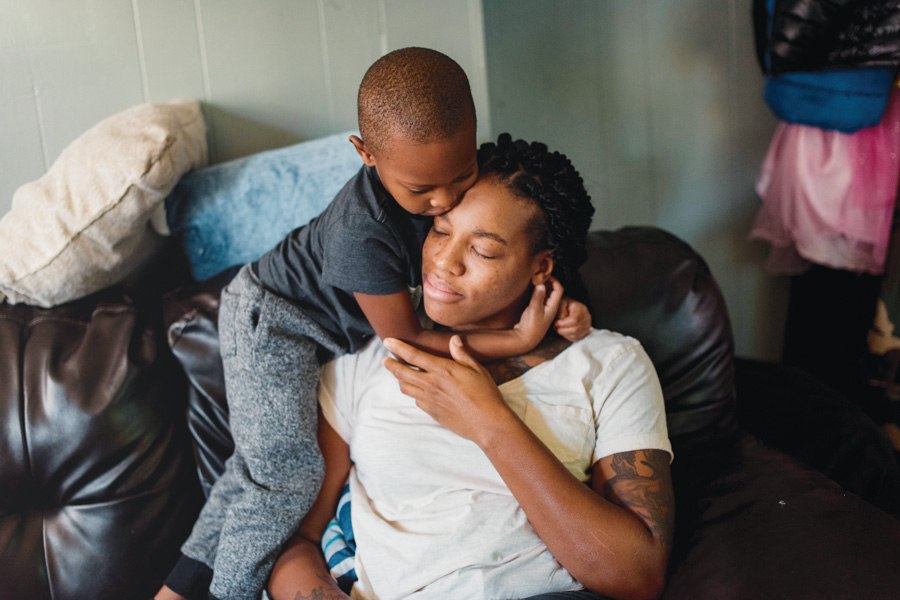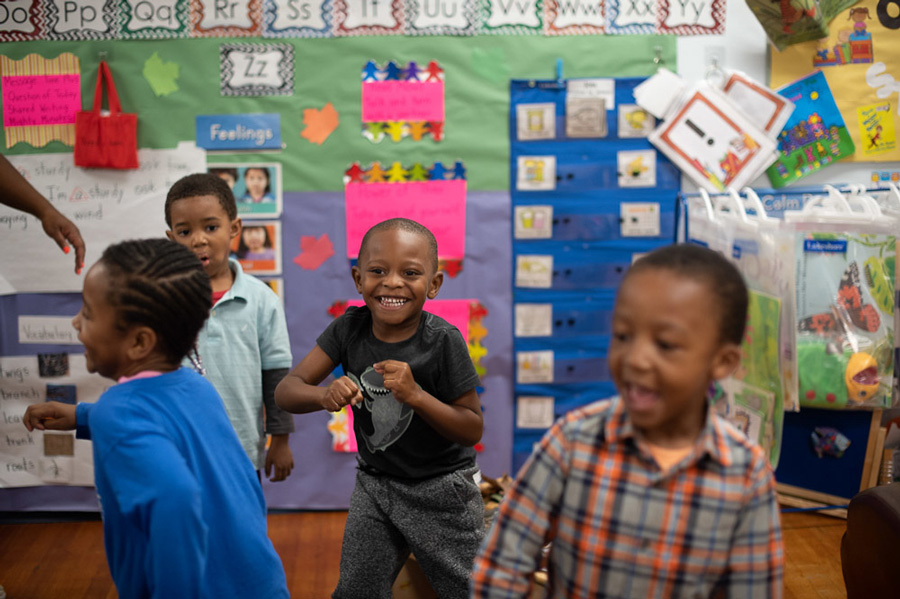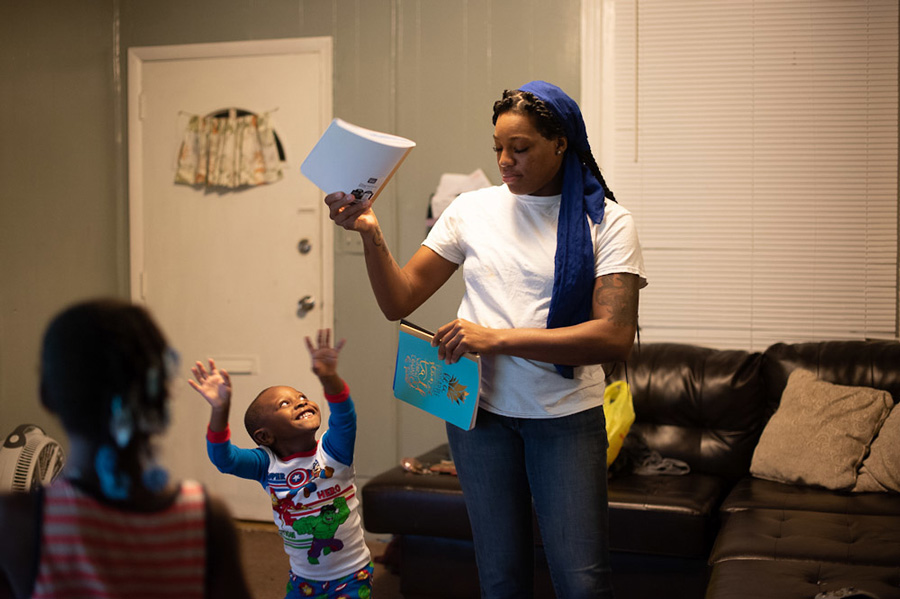Here’s How Philadelphia’s Pre-K Program Can Change an Entire Family’s Economic Prospects
We all know the benefits of early childhood education for kids. But the program has the potential to open up possibilities for their caretakers too.

Margaret Cobb and her son, Trent Felder, in their Southwest Philly home. Photograph by Hannah Yoon
This article is published in partnership with the Fuller Project. Malcolm Burnley is a journalist with the Fuller Project, a global newsroom that reports on issues affecting women. The story is part of a series called “Zig Zag: the Winding Path to Making Ends Meet in Philadelphia,” which focuses on how improving one facet of a person’s life — from housing, to education, to business — can establish a stable foundation for economic mobility. The series is produced with support from Broke in Philly, a collaborative reporting project on solutions to poverty and the city’s push toward economic justice.
When the conga line forms in the spacious classroom, Trent Felder doesn’t hold back. After taking a solo lap around his classmates and pumping his fist in the air, he settles into place, standing right below an alphabet tacked to the wall. Four-year-old Trent is like a hummingbird, arms and legs aflutter, a dizzying blur of gyrations and air kicks. Then he suddenly stops. The musical instruction said so: Now shake … and freeze, a woman’s voice chants to a beat.
On a chilly afternoon in October of last year, Trent is ecstatic to be inside his classroom on a tree-lined block of 71st Street in the Elmwood Park section of Southwest Philly. Wearing a t-shirt emblazoned with a glow-in-the-dark shark, sweatpants and boots, he’s attending Your Child’s World Learning Center. It’s one of 138 locations for early childhood education that are part of PHLpreK, the city’s relatively new signature program funded by the Philadelphia Beverage Tax.
Trent is one of 8,000 children, all three and four years old, who have attended Philly’s free pre-kindergarten in the three school years since the city’s program began enrolling kids in 2017. Mayor Jim Kenney, architect of the controversial beverage tax, better known as the soda tax, has framed PHLpreK as an anti-poverty strategy that will also work to reduce persistent achievement gaps in the public-school system by preparing kids earlier. Similar publicly funded programs have recently sprouted in cities across the country — localized efforts to bring the U.S. in line with nations like Japan, the U.K. and Mexico, which have committed to enrolling 100 percent of their four-year-olds in preschool.
While the effectiveness of the nascent PHLpreK is still unproven statistically, a growing body of research from elsewhere in the country supports Kenney’s investment. Universal public pre-kindergarten — or near-universal, as is the case in Philly — has a track record of improving educational and economic outcomes for students, boosting the likelihood they graduate from high school, reducing their involvement in criminal activity, and even improving their overall health. It’s the starting line for potentially thousands of Philadelphians to break out of a cycle of poverty and, for the city, a way to ease the stubbornly high rate of economic disadvantage that has existed for decades.

Photograph by Hannah Yoon
But the smile on Trent’s face tells you all you need to know. Moments after he congas around the room, Trent is seated on a mat with classmates. He’s calmer now and able to take in the instructions from his PHLpreK teacher, Ms. Moody: “Take a deep breath,” she says, filling up her lungs. The room lets out a collective sigh. Around two o’clock, some parents begin to slink into the classroom, watching from the perimeter. They include Trent’s mother, Margaret Cobb, who dropped him off five hours ago, following another graveyard shift for SEPTA.
“I loved the program,” Margaret says later about PHLpreK. “Trying to teach him at home, it’s so hard, because he’s worried about so much other stuff. But once he went to pre-K, it was more like regular school: He had a uniform, he had to be at school on time, he had a designated lunchtime, and he actually learned things there.”
Margaret believes that Trent has grown emotionally and academically at PHLpreK. But the program has been beneficial to their family beyond Trent’s development. Margaret — who is no longer in a relationship with Trent’s dad, Troy (they co-parent but live separately) — has been able to save on babysitting costs and free up time for professional development. “It absolutely has made a big difference,” Margaret says of her finances. The daycare she had Trent enrolled in before finding PHLpreK was as expensive as her monthly rent of $800 a month, making it ultimately unaffordable at her salary at the time of $19 an hour. But PHLpreK gave her more flexibility, and in February of this year she began a new job for SEPTA as a construction equipment operator, with better pay and daytime hours.
Unfortunately, there’s been less dancing since the calendar turned to 2020. “Everything got shut down,” Margaret says. “As for me, I’ve been working nonstop.”
As an essential worker, Margaret hasn’t skipped a beat with her job during the pandemic. But Trent’s classroom, along with the rest of PHLpreK, closed on March 16th for the remainder of the school year as part of Governor Tom Wolf’s statewide shutdown order. Margaret says she didn’t bother looking into the childcare programs advertised exclusively for essential workers. It would be a poor facsimile of what Trent had grown to love. Instead, for most of the summer, his dad found activities for him during the day.
“I’m so upset he’s not going to actual school,” Margaret says in June. “He’s still talking about his teacher.”
When I first met Trent, he was looking for caterpillars on the concrete patio of his Southwest Philly home. It was May 2019, a week after he’d celebrated his fourth birthday. He quickly told me about his cake — dyed yellow and black, just like Bumblebee, his favorite Transformer — and his battery-powered car. Trent then began fiddling with my recorder, asking how it works. I could hardly keep up as he roamed around the tiny yard, a megawatt smile on his face.
Margaret and Trent, along with her mother, brother and niece, were all living together in a three-story rowhome. At the time, Margaret was working a 10 p.m.-to-6 a.m. schedule every weekday, doing maintenance in the tunnels for SEPTA. The upside: It allowed her to pick up and drop off Trent at PHLpreK. She slept in between.

Photograph by Hannah Yoon
Like mother, like son: Margaret has a curious mind, which is one of the reasons, she says, she really likes working for SEPTA: “There are so many different career paths and areas to explore.” About the only thing that could be better, she says, are the childcare benefits. When Trent was an infant, she was able to rely on the help of her family. But by the time he turned two, the burden shifted to Margaret, who enrolled in a state-run subsidy program that helps families who are short on resources pay for childcare. When she started at SEPTA, she got a salary bump and was no longer eligible. Margaret was left to pay for daycare on her own, at a price totaling $185 a week. The additional cost ate up almost all of her salary increase.
That’s when she started looking into a program she’d heard about from a relative: PHLpreK, which accepts students based on age and residency but not economic status. While the city doesn’t collect income information from families enrolled in PHLpreK, for the 2019-2020 year, 69 percent were living at or below twice the federal poverty level (the threshold researchers prefer to use), according to voluntary survey data. The program began with a campaign pledge to initiate universal pre-K by then-mayoral candidate Jim Kenney in 2015. At the time, there were an estimated 17,000 children in Philly ages three and four without access to strong early childhood education.
Then, as mayor, Kenney tapped the controversial soda tax as the primary funding for PHLpreK, which slowed the start of the program. After City Council passed the tax in June of 2016 — becoming the first major U.S. city to successfully enact such a measure — its revenues were tied up for almost two years, until a lawsuit challenging its constitutionality was tossed out by the Pennsylvania Supreme Court. Initial projections by the city that it could provide 6,500 classroom seats annually were revised downward when officials discovered a deficit of high-quality providers willing to participate and demanded more resources to go toward supporting them.
But the program appeared to be hitting its stride this year — right when COVID struck. “Before the pandemic, the city planned to expand PHLpreK from 3,300 funded seats to 4,300 seats in 2020-2021,” says Sarah Peterson, communications director for the Philadelphia Office of Children and Families. “We have adjusted that plan.” The number of children enrolled this year is 2,800 as of late September. It’s down slightly from last year, but the city continues to accept families on a rolling basis. So the number of PHLpreK seats being offered is the same as in the 2019-2020 school year. The pandemic shouldn’t threaten future expansion, according to Peterson, in part because the Kenney administration has refused to cut PHLpreK funding, even as cost-cutting measures are enacted citywide due to the national economic downturn. As a result, PHLpreK funding remains steady, with a $37 million budget for fiscal year 2021.
While that price tag is large, the city should recoup the money over the long term, assuming the program’s high quality standards are met. In 2014, an Obama administration analysis noted that “the existing research suggests expanding early learning initiatives would provide benefits to society of roughly $8.60 for every $1 spent.” Some of these gains, like increased parental earnings and employment, happen quickly, while others, like boosted lifetime incomes for the children, pay off down the road in perpetuity.
Since March, Margaret had been trying to get Trent to follow the virtual lesson plans that PHLpreK provided through a smartphone app. “But he’s always asking: Why can’t we go to the aquarium? Why can’t we go to the beach? Because of the coronavirus?” she says. It’s been hard for Trent to be out of school; he thrived on the social aspects of learning. “When I’d drop him off, he’d always be getting hugs from the other kids,” says Margaret. “He was Mr. Popular.”
As the pandemic has worn on, Margaret has worried more and more that Trent isn’t getting that daily structure. She figured he’d be in kindergarten in person in September, but those plans were spoiled when the district shifted to an entirely virtual learning model to start the school year. While virtual classrooms are a challenge for everyone, they’re especially problematic for parents, like Margaret, who can’t work from home and don’t have the means to choose schooling over income. “I think he’ll be all right,” she says, before getting nostalgic over the joy the program brought to Trent. “I miss it.”
Even in its short duration, PHLpreK was a major boon for her household. It didn’t just help Margaret’s prospects at work; her brother, after living with her for the better part of a year, purchased a house of his own in 2020. “He wouldn’t have been able to save up money if I was asking him for money — if I couldn’t afford rent on my own, you know?” Margaret says. “So it helped all of us.”
When Trent turned five in May, Margaret threw him a quiet birthday. The theme was monster trucks, one of his newer passions. Trent’s father bought him a small dog, after the snake he’d been keeping, which was about three feet long uncoiled, got transferred (permanently) out of his mom’s house. “He’s been home, having a ball without me,” Margaret says of the summer. She’s been working without interruption and asking family members to look after Trent. Since September, he’s been living with his dad during the school week, which is more conducive to remote learning, given Margaret’s schedule. She’s now working for SEPTA from 7 a.m. to 3 p.m. on weekdays.
Margaret says that PHLpreK set her up for continued success at work, even if she’s back to juggling more childcare duties during COVID. Whatever the program’s long-lasting effects on Trent’s education may be — and she believes they’ll be significant — Margaret knows the program has given her confidence in her own economic attainment.
Still, Trent can be a lot to keep up with. When I ask Margaret, “Do you get to catch up with sleep on the weekends?,” she just laughs.
“That boy never stops,” she says. “I love him.”

Philadelphia magazine is one of more than 20 news organizations producing Broke in Philly, a collaborative reporting project on solutions to poverty and economic mobility in the city. Read all our reporting here.


